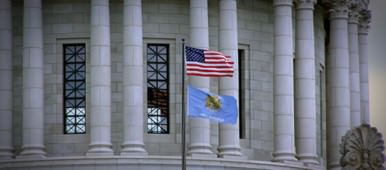
- Mediation
- Arbitration
- Court Neutrals
- Online Dispute Resolution
- Technology
- Court Decisions
- More
- Legislation
- Healthcare
- Guest Posts
- John DeGroote
- John C. Fleming
- Rick Freeman
- Professor Peter Friedman
- Honorable W. Royal Furgeson, Jr.
- James M. Gaitis
- Laura A. Kaster
- Professor John Lande
- Philip J. Loree, Jr.
- Michael McIlwrath
- F. Peter Phillips
- Professor Alan Scott Rau
- Professor Thomas J. Stipanowich
- Professor S.I. Strong
- Richard Webb
- Glen M. Wilkerson
- International arbitration
- Regulation
- Sports and Entertainment
- We’re Back!!!!Well, it’s been a while since we published and that is about to change. Since I spent much of last year becoming
 JAMS Welcomes Karl Bayer to its Panel of NeutralsJAMS, the world’s largest private alternative dispute resolution (ADR) provider, is pleased to announce that Karl Bayer
JAMS Welcomes Karl Bayer to its Panel of NeutralsJAMS, the world’s largest private alternative dispute resolution (ADR) provider, is pleased to announce that Karl Bayer Class Action Waivers in Arbitration Agreements: The Twenty-First Century Arbitration Battleground and Implications for the EU CountriesLinda S. Mullenix, Morris & Rita Atlas Chair in Advocacy at the University of Texas School of Law, has written “Class Ac
Class Action Waivers in Arbitration Agreements: The Twenty-First Century Arbitration Battleground and Implications for the EU CountriesLinda S. Mullenix, Morris & Rita Atlas Chair in Advocacy at the University of Texas School of Law, has written “Class Ac Picking the Proper Technological Tool for Problem-Solving in ArbitrationProfessor Amy J. Schmitz, John Deaver Drinko-Baker & Hostetler Chair in Law and Co-Director of the Translational Data An
Picking the Proper Technological Tool for Problem-Solving in ArbitrationProfessor Amy J. Schmitz, John Deaver Drinko-Baker & Hostetler Chair in Law and Co-Director of the Translational Data An
Recent Posts
The Guide to Dispute Resolution Processes
The American Bar Association (ABA) Guide to Dispute Resolution Processes is designed to educate members of the public about dispute resolution processes commonly used to resolve legal, community, school, public policy and many other types of disputes. You may download the Guide (for free) here. “What Is Dispute Resolution? Dispute resolution is a term that refers to a number of processes that can be used to resolve a conflict, dispute or claim. Dispute resolution may also be referred to as alternative dispute resolution, appropriate dispute resolution, or ADR for short. Dispute resolution processes are alternatives to having a court (state or federal judge or jury) decide the dispute in a trial or other institutions decide the resolution of the case or contract. Dispute resolution processes can be used to resolve any type of dispute including family, neighborhood, employment, business, housing, personal injury, consumer, and environmental disputes.” ~The American Bar Association (ABA) Guide to Dispute Resolution Processes
Continue reading...Court of Appeals of Texas Finds No Evident Partiality or Gross Mistake and Affirms Confirmation of an Arbitration Award
The Court of Appeals for the First District of Texas at Houston did not find evident partiality or gross mistake and affirmed the district court’s confirmation of an arbitration award. Background In FCA Construction Company, LLC v. J & G Plumbing Services, LLC, No. 01-10-01034-CV (Tex. App.—Houston [1st Dist.] Mar. 8, 2012) a dispute arose between FCA Construction Company (“FCA”) and its plumbing subcontractor, J & G Plumbing Services (“J & G”) during the construction of a fitness center in Texas. FCA ultimately terminated J & G and hired a new plumbing subcontractor. Pursuant to their contract, the parties submitted their dispute to final and binding arbitration. They selected William Andrews as their arbitrator. Prior to the arbitration, Andrews sent counsel for FCA and J & G a letter disclosing his existing relationship with counsel for J & G. After receiving the disclosure, FCA agreed to have the arbitration heard by Andrews. Ultimately, Andrews entered a final arbitration award in favor of J & G on its wrongful termination and breach of contract claims against FCA. The trial court confirmed the arbitration award. Court of Appeals FCA contended that the trial court should have vacated the arbitration award on grounds of (1) evident partiality under section 171.088 of the Texas Civil Practices and Remedies Code (“TCPRC”) and (2) gross mistake under Texas common law. The Court overruled both issues and affirmed the trial court’s judgment. Section 171.088(a)(2)(A) of the TCPRC directs a trial court to vacate an arbitration award if the rights of a party were prejudiced by evident partiality by a neutral arbitrator. Following Texas Supreme Court precedence, the Court stated that the standard applied in determining whether a neutral arbitrator exhibited evident partiality is whether the arbitrator did not disclose facts which might, to an objective observer, create a reasonable impression of the arbitrator’s partiality. Evident partiality is established by nondisclosure itself. FCA did not contend that Andrews failed to disclose any facts, but urged the Court to adopt a second standard adopted by the El Paso Court of Appeals in 2010. The El Paso court looked to federal law to determine that evident partiality can be shown by actual bias in addition to nondisclosure. The “actual bias” test requires a party asserting actual bias to produce specific facts demonstrating that a reasonable person would have concluded that the arbitrator was partial to one party. FCA argued that the transcript of the arbitration showed that Andrews was anything but fair and impartial during the proceeding. FCA argued that Andrews assumed an adversarial role against FCA by questioning its witnesses more than J & G’s witnesses and voicing displeasure when FCA’s witnesses refused to recant their testimony. Without addressing whether evident partiality can be established based on a showing of actual bias, the Court concluded that FCA had not met its burden of demonstrating actual bias under the test because FCA’s allegations did not rise to the level of producing specific facts from which a reasonable person would conclude that the arbitrator was partial to one party. Furthermore, the Court noted that FCA identified no Texas or federal authority for the proposition that bias may be inferred when an arbitrator questions one side’s witnesses more extensively than the other side’s witnesses. The Court overruled FCA’s first issue. The Court recognized that Texas common law allows a trial court to set aside an award if the arbitrator’s decision is tainted by fraud, misconduct, or gross mistake as would imply bad faith and failure to exercise honest judgment, and gross mistake results in a decision that is arbitrary or capricious. However, an honest judgment made after due consideration given to conflicting claims is not arbitrary or capricious, even if the judgment is erroneous. The Court even noted that it may not vacate an award merely because it was based on a mistake of fact or law. FCA argued that the contract language and undisputed facts established its right to recover on its claim and defeated J & G’s right to recover. Thus, Andrews committed gross mistake by concluding otherwise. Andrews concluded that J & G’s alleged breaches were not material. Instead, he decided the alleged breaches did not entitle FCA to breach of contract damages and did not justify FCA’s termination of J & G. The Court did not determine the proper construction of the parties’ contract. Its review was limited to whether Andrews’s failure to adopt FCA’s interpretation of the contract constituted bad faith or a failure to exercise honest judgment. FCA’s complaints were arguments that Andrews erred in applying the law and in determining facts, but FCA failed to establish that Andrews acted in bad faith or failed to exercise honest judgment. The Court overruled FCA’s second issue. Jeremy Clare is a law clerk at Karl Bayer, Dispute Resolution Expert. Jeremy received his J.D. from the University of Texas School of Law in 2012 and received a B.A. from the University of South Carolina where he studied political science.
Continue reading...Developments in International Arbitration: Austria, Turkey, Ecuador, UK, Cyprus & Malaysia
Following are this month’s recent developments in international arbitration law published by the International Law Office(free registration is required to view the articles): Austria: Supreme Court takes restrictive view on state immunity Istanbul: Istanbul set to become international arbitration centre Ecuador: Arbitral tribunal rules against Ecuador United Kingdom: English courts may enforce award that has been set aside Cyprus: Impact of arbitral tribunal order on Cypriot court judgment Malaysia: Court rules on role of foreign advocates in arbitration proceedings Stay tuned!
Continue reading...U.S. Supreme Court Vacates Oklahoma Supreme Court: FAA Statue Prevails over Oklahoma State
The U.S. Supreme Court vacated an Oklahoma Supreme Court decision because the decision ignored a basic tenet of the Federal Arbitration Act (“FAA”) and did not allow the arbitrator to rule on the validity of the contracts. Background In Nitro-Lift Technologies, L.L.C. v. Eddie Lee Howard, et al, 568 U.S. ___ (Nov. 26, 2012), a dispute arose between Nitro-Lift Technologies (“Nitro-Lift”) and two of its former employees, Eddie Lee Howard and Shane D. Schneider (“employees”). The employees each entered into a contract with Nitro-Lift that contained a confidentiality agreement, noncompetition agreement, and arbitration clause. After working for Nitro-Lift in Oklahoma, Texas, and Arkansas, the employees quit and began working for one of Nitro-Lift’s competitors. After Nitro-Lift filed for arbitration, the employees filed suit in an Oklahoma District Court and asked the court to declare the noncompetition agreements null and void. The district court dismissed the complaint and found that an arbitrator must settle the dispute, not the court. The Oklahoma Supreme Court granted the employees’ appeal and ordered the parties to show cause why the matter should not be resolved by application of Okla. Stat., Tit. 15, §219A which limits the enforceability of noncompetition agreements. Nitro-Lift relied on several U.S. Supreme Court decisions and argued that any dispute regarding the contracts’ enforceability was a question for the arbitrator because the FAA applies in both state and federal courts. The Oklahoma Supreme Court did not agree. The court found that the arbitration agreements did not prohibit judicial review of the underlying agreements and held that the noncompetition agreements were void and unenforceable as against Oklahoma public policy. U.S. Supreme Court After establishing jurisdiction, the Supreme Court addressed the Oklahoma Supreme Court decision. The Court stated that the Oklahoma Supreme Court disregarded U.S. Supreme Court precedents on the FAA. The Court highlighted that it is well settled that the substantive law of the FAA is applicable in state and federal courts. Furthermore, the Court said that it is a mainstay of the FAA’s substantive law that attacks on the validity of the contract are to be resolved by the arbitrator in the first instance and not by a federal or state court. The Court found that the contracts contained a valid arbitration agreement and the Oklahoma courts must abide by the FAA. The Court rejected the argument that the specific Oklahoma law governs over the general FAA that favors arbitration. That principle applies only to conflicts between laws of equivalent dignity, the Court said. The Court concluded that the general federal statute prevails over the specific state statute. Therefore, the arbitrator should have decided whether the covenants not to compete are valid as a matter of applicable state law. Accordingly, the Court vacated the decision and remanded for proceedings consistent with the opinion. Jeremy Clare is a law clerk at Karl Bayer, Dispute Resolution Expert. Jeremy received his J.D. from the University of Texas School of Law in 2012 and received a B.A. from the University of South Carolina where he studied political science.
Continue reading...Arbitration
Mediation
Healthcare Disputes
Legal Research
About Disputing
Disputing is published by Karl Bayer, a dispute resolution expert based in Austin, Texas. Articles published on Disputing aim to provide original insight and commentary around issues related to arbitration, mediation and the alternative dispute resolution industry.
To learn more about Karl and his team, or to schedule a mediation or arbitration with Karl’s live scheduling calendar, visit www.karlbayer.com.










